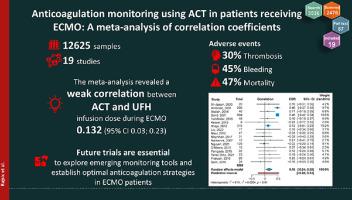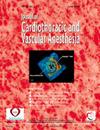体外膜氧合患者使用活化凝血时间进行抗凝监测:相关系数的 Meta 分析。
IF 2.3
4区 医学
Q2 ANESTHESIOLOGY
Journal of cardiothoracic and vascular anesthesia
Pub Date : 2024-08-05
DOI:10.1053/j.jvca.2024.07.048
引用次数: 0
摘要
目的:体外膜肺氧合(ECMO)需要全身抗凝来维持回路的通畅。然而,使用抗凝疗法存在严重出血的风险,因此必须进行严格监测。活化凝血时间(ACT)是一种广泛使用的监测工具;然而,其与非分数肝素(UFH)输注剂量相关性的证据却很有限。在此,我们旨在分析 ECMO 期间 ACT 与 UFH 输注之间的相关性:系统文献综述和相关系数荟萃分析(Scopus 和 PubMed,截至 2024 年 7 月 13 日):CRD42023448888设置:所有回顾性和前瞻性研究 参与者: 接受 ECMO 支持的患者干预:ECMO 支持期间的抗凝监测 测量和主要结果:19 项研究被纳入分析,荟萃分析包括 16 项研究。绝大多数研究(15 项)发现相关性较弱,没有研究报告 ACT 与 UFH 输注剂量之间存在强相关性。荟萃分析(n = 12,625 个样本)发现两者之间存在弱相关性,相关系数的汇总估计值为 0.132(95% 置信区间为 0.03-0.23)。最常见的不良事件是出血(集中发生率为45%)和血栓形成(30%),47%的患者在住院期间死亡:结论:尽管 ACT 是 ECMO 患者广泛使用的 UFH 监测工具,但我们的荟萃分析发现 ACT 与 UFH 输注剂量之间的相关性较弱。需要进行新的试验来研究新工具的作用,并明确接受 ECMO 支持的患者最合适的监测策略。本文章由计算机程序翻译,如有差异,请以英文原文为准。

Anticoagulation Monitoring Using Activated Clotting Time in Patients Receiving Extracorporeal Membrane Oxygenation: A Meta-Analysis of Correlation Coefficients
Objective
Extracorporeal membrane oxygenation (ECMO) requires systemic anticoagulation to maintain the circuit patency. However, the use of anticoagulation carries a risk of severe hemorrhage, necessitating rigorous monitoring. Activated clotting time (ACT) is a widely used monitoring tool; however, the evidence of its correlation with unfractionated heparin (UFH) infusion dose is limited. Here we aimed to analyze the correlation between ACT and UFH infusion during ECMO.
Design
Systematic literature review and meta-analysis of correlation coefficients (Scopus and PubMed, up to July 13, 2024). PROSPERO: CRD42023448888
Setting
All retrospective and prospective studies
Participants
Patients receiving ECMO support
Intervention
Anticoagulation monitoring during ECMO support
Measurements and Main Results
Nineteen studies were included in the analysis, and the meta-analysis encompassed 16 studies. The vast majority of studies (n = 15) found a weak correlation, and no study reported a strong correlation between ACT and UFH infusion dose. The meta-analysis (n = 12,625 samples) identified a weak correlation, with a pooled estimate of correlation coefficients of 0.132 (95% confidence interval 0.03-0.23). The most common adverse events were hemorrhage (pooled incidence, 45%) and thrombosis (30%), and 47% of the patients died during their hospital stay.
Conclusions
Even though ACT is a widely used UFH monitoring tool in ECMO patients, our meta-analysis found a weak correlation between ACT and UFH infusion dose. New trials are needed to investigate the role of emerging tools and to clarify the most appropriate monitoring strategy for patients receiving ECMO support.
求助全文
通过发布文献求助,成功后即可免费获取论文全文。
去求助
来源期刊
CiteScore
4.80
自引率
17.90%
发文量
606
审稿时长
37 days
期刊介绍:
The Journal of Cardiothoracic and Vascular Anesthesia is primarily aimed at anesthesiologists who deal with patients undergoing cardiac, thoracic or vascular surgical procedures. JCVA features a multidisciplinary approach, with contributions from cardiac, vascular and thoracic surgeons, cardiologists, and other related specialists. Emphasis is placed on rapid publication of clinically relevant material.

 求助内容:
求助内容: 应助结果提醒方式:
应助结果提醒方式:


